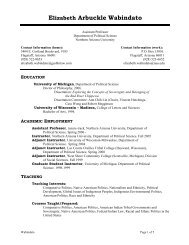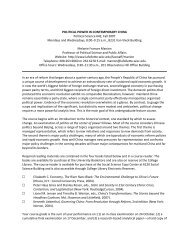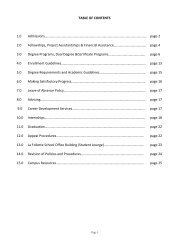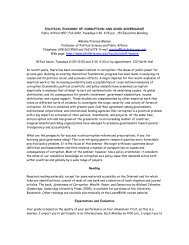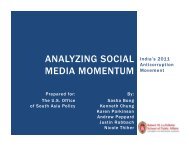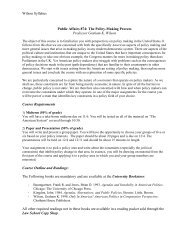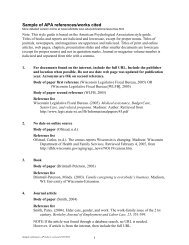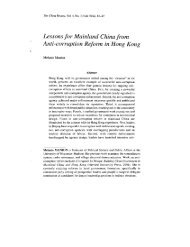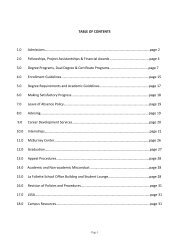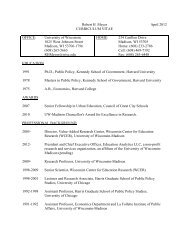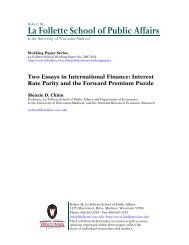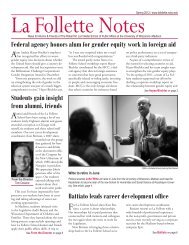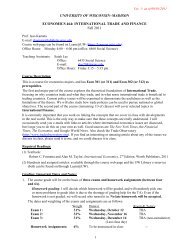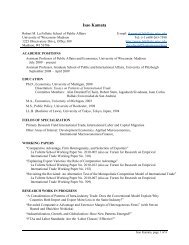SAVE Commission's findings - La Follette School of Public Affairs ...
SAVE Commission's findings - La Follette School of Public Affairs ...
SAVE Commission's findings - La Follette School of Public Affairs ...
You also want an ePaper? Increase the reach of your titles
YUMPU automatically turns print PDFs into web optimized ePapers that Google loves.
3. Delivering community programming<br />
such as public affairs, lifelong learning,<br />
public involvement and cultural networking<br />
(see Preamble).<br />
4. Providing local and state government<br />
coverage and service, such as legislative<br />
coverage and<br />
public hearings<br />
(see Preamble).<br />
5. Delivering training<br />
and information<br />
to public<br />
employees (see<br />
Goal #20).<br />
6. Allowing userfriendly<br />
transactions<br />
with government<br />
on functions such as licenses and<br />
permits (see Goals #15 and #21).<br />
7. Creating partner-city relationships<br />
linking Wisconsin with cities and states<br />
(see Goal #9).<br />
8. Connecting Wisconsin knowledge<br />
providers with customers around the<br />
world as part <strong>of</strong> an intellectual capital<br />
strategy (see Goal #9).<br />
9. Serving the court system in all dimensions,<br />
from taking depositions to cost<br />
effectively taking expert testimony from<br />
distant points (see Goal #22).<br />
“Agency agendas, schedules,<br />
reports and activities should be<br />
on computer to facilitate<br />
communication between<br />
citizens and government.”<br />
Thomas Steele, <strong>La</strong> Crosse<br />
10. Putting government information on-line<br />
in a cost effective, revenue-neutral<br />
fashion (see Goal #16).<br />
Statewide service will be responsive to regional<br />
interests, which will have community<br />
ownership and be responsible for content development.<br />
The consortium<br />
might involve<br />
vocational schools, K-<br />
12 systems, not-forpr<strong>of</strong>its<br />
and others.<br />
Programming and the<br />
local infrastructure<br />
will be financed by a<br />
variety <strong>of</strong> means, including<br />
commercial<br />
presentations, user<br />
fees, subscriptions and<br />
government underwriting.<br />
An important part <strong>of</strong> the Utility will be<br />
making library services, both electronic and<br />
traditional, accessible to every citizen, which<br />
will be possible through on-line electronic communications<br />
to homes, schools and businesses.<br />
Computer visionary Bill Gates talks <strong>of</strong> the high<br />
school student looking up a homework assignment<br />
on pre-Colombian art by surfing the<br />
stacks <strong>of</strong> libraries around the world—all the<br />
while sitting on his kitchen stool. The Information<br />
Utility will be there to help the student<br />
surf Wisconsin and the entire world <strong>of</strong><br />
knowledge.<br />
Actions<br />
12.1<br />
Create a <strong>Public</strong><br />
Information Utility.<br />
12.2<br />
Transform libraries into<br />
distance learning<br />
partners.<br />
R E S U L T S<br />
Information age<br />
utility will:<br />
1 Provide cost effective standards<br />
that will make information<br />
access uniform across regions,<br />
educational institutions,<br />
government agencies and<br />
individual organizations.<br />
2 Save taxpayer money by<br />
reducing the capital costs <strong>of</strong><br />
distance learning through<br />
avoidance <strong>of</strong> duplicative and<br />
incompatible technology<br />
acquired by different levels <strong>of</strong><br />
government and education.<br />
3 Decrease the cost <strong>of</strong> access by<br />
consolidating distance learning<br />
programs and technology<br />
currently spread across many<br />
agencies.<br />
4 Increase citizen access to the<br />
knowledge and information <strong>of</strong><br />
the next century independent <strong>of</strong><br />
the barriers <strong>of</strong> distance or<br />
educational institution affiliation.<br />
5 Make the library resources <strong>of</strong><br />
the University System available<br />
for all citizens <strong>of</strong> the state.<br />
6 Reduce the time and cost <strong>of</strong><br />
citizen access to government<br />
information at a level <strong>of</strong> detail<br />
unavailable currently to all but<br />
specialists in Madison.<br />
7 Change the role <strong>of</strong> state<br />
employees to both providers <strong>of</strong><br />
information to citizens and<br />
consumers <strong>of</strong> information from<br />
citizens.<br />
CITIZEN • COMMUNITY • GOVERNMENT — WISCONSIN: THE 21 ST CENTURY 37



